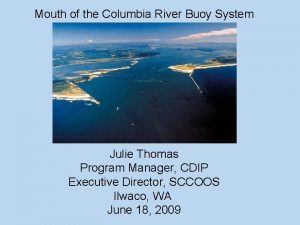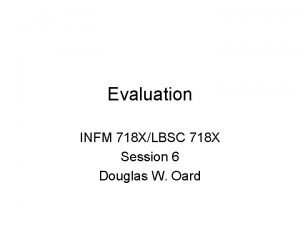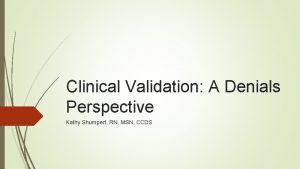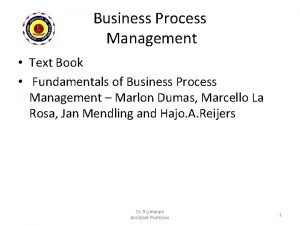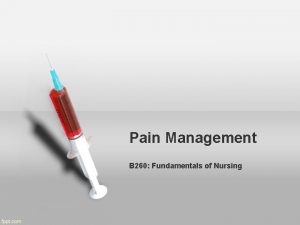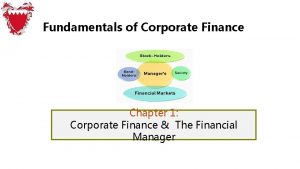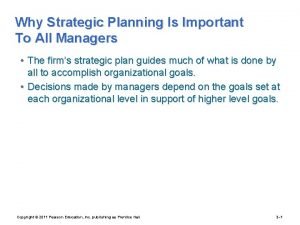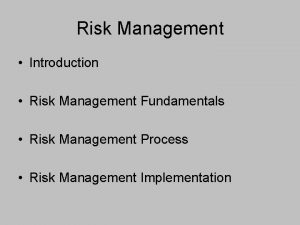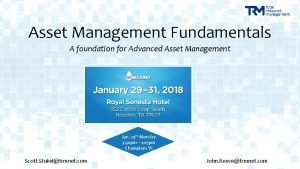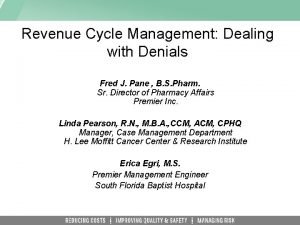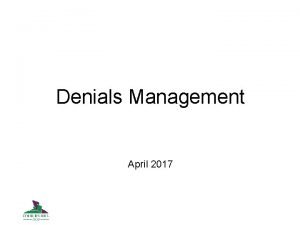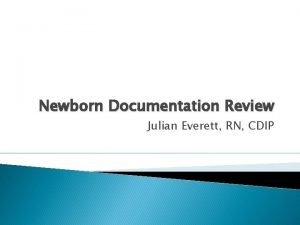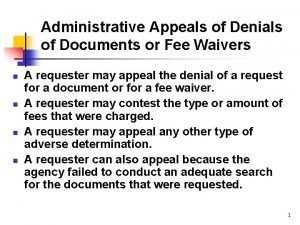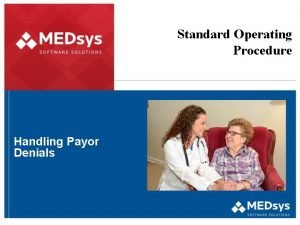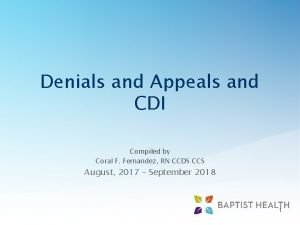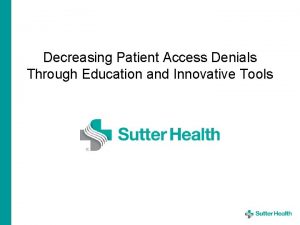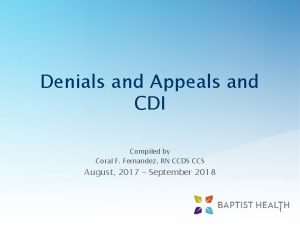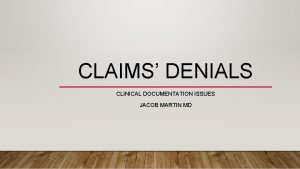Fundamentals of Denials Management Haaris Ali MD CDIP


















- Slides: 18

Fundamentals of Denials Management Haaris Ali, MD, CDIP ACDIS

Agenda Denials Commonly Used Terminology What We See and Why Root Causes Denials Management and Prevention How CDI Plays a Vital Role The Comprehensive Solution Current Payor Trends © Proprietary Confidential Information of R 1 RCM Inc. 10/24/2020 2

What is a Denial? Anything at risk for write off § You expected to get paid for it and you didn’t § Typically categorized into 2 groups − Clinical: does not appear to meet medical necessity, no authorization, LCD/NCD, DRG Downgrade − Technical: administrative in nature (timely filing) © Proprietary Confidential Information of R 1 RCM Inc. 10/24/2020 3

Definitions § Remit − Notice of and explanation of reasons for payment, adjustment, denial, and/or non covered charges of a medical claim § 835 − Electronic remit from payor through claims submission system − 837 is the actual submission from the provider to the payor § ANSI Code − American National Standards Institute − Standardized claim adjustment reason codes (whatever) § EOB − Explanation of benefits § Denial Code − ANSI code present on remit § Contractual − Negotiated discount between payor and provider § Expected − “Net” is expected payment after discount applied − “Gross” is total charges with no discount yet applied © Proprietary Confidential Information of R 1 RCM Inc. 10/24/2020 4

Gross vs. Net Example: Total charges of $10, 000 with a negotiated payor discount of 75% GROSS NET $10, 000 Total Charges $0 Discount Applied $7, 500 Negotiated Discount $10, 000 Account Balance $2, 500 Account Balance © Proprietary Confidential Information of R 1 RCM Inc. 10/24/2020 5

Who Denies These Claims? § Medicare hires contractors referred to as MACs who are fiscal intermediaries who make payments on behalf of Medicare. § RACs are contractors hired by Medicare to audit and collect overpayments to hospitals. § QIO’s- Quality Improvement Organizations § For commercial, generally someone with advanced medical training will review these claims (i. e. Medical director, nurses with advanced training). © Proprietary Confidential Information of R 1 RCM Inc. 10/24/2020 6

What We See and Why Inpatient No Authorization Inpatient Not Medically Necessary Other Lack of process Severity of illness and failure to evaluate exclusionary criteria Mental health diagnosis (in an acute setting) Lack of skillset Plan of care, therapy notes, MD documented clinical evidence IP Rehab lack of documentation Lack of capacity Intensity of service DRG Validation Length of stay Lack of process © Proprietary Confidential Information of R 1 RCM Inc. 10/24/2020 7

Root Causes Primary § No attempt to get an authorization § Authorization attempted and the payor said no § Authorization attempted but for the incorrect service or level Secondary § § § Lack of documentation present Lack of reaction to payor’s denial of authorization Incorrect/insufficient documentation pushed to payor Lack of timeliness with throughput process Under utilization of tools available (Midas, Allscripts, etc. ) © Proprietary Confidential Information of R 1 RCM Inc. 10/24/2020 8

What is Denials Management? Prevention Recovery Where is your ROI…? © Proprietary Confidential Information of R 1 RCM Inc. 10/24/2020 9

Prevention Standardization Education Accountability Throughput Payor Policy Daily Peer to Peer Third Party Criteria Historical vs. Current Reporting Documentation Reportable Timeliness Monthly Financial Impact © Proprietary Confidential Information of R 1 RCM Inc. 10/24/2020 10

CDI and Denials Prevention § Strengthen the case − Code to the highest level of specificity • Capture acuity by coding CCs and MCCs according to the updated coding clinics and coding guidelines o If you have 1 MCC, try finding another o AKI – verify the physician’s documentation supports CC − Look for missed documentation opportunities • Focus on DRGs with CC’s and MCC’s § Robust query process to prevent under-coding, but don’t over code − Quality queries − Productivity is important, but quality is key § Develop and periodically review processes − Develop hospital medical staff policies on commonly audited CCs/MCCs- AKI, malnutrition, ac resp failure, sepsis and follow them − Identify workflow breakdowns early on § Post-Discharge Reviews − SOI, ROM § Quality Assurance Programs § Education § Use the PEPPER report to proactively compare performance to other facilities © Proprietary Confidential Information of R 1 RCM Inc. 10/24/2020 11

Comprehensive Denials Solution What is it? Diagnostic Framework Prevention Roadmap Accountability Framework Workflow Framework Why is it important? § Root cause identification of denial reason at actionable level § Denial reporting complex must have robust, accurate reporting to determine: ─ Which denials are worth cash ─ Which areas are causing denials ─ Which processes are not working § Implement prevention best practices § Solutions have many flavors – technology enhancement, process redesign, physician education § Industry best practices must be often tailored to specific payer requirements, specific processes § Must focus on early warning systems to capture potential denials before they occur § Define operation rhythm of meetings, action items, owners, timelines § Goal setting § Frequent meeting cadence with key stakeholders § Regular tracking of metrics § Problem solving sessions § Follow-up/appeals post denial § Best strategies to win appeal § Feedback loop to avoid future denials § Often, denials can be appealed and won, 50%-60% industry overturn rate § Payers make mistakes too! § Must be integrated with prevention work for robust feedback loops © Proprietary Confidential Information of R 1 RCM Inc. 10/24/2020 12

Revenue Recovery Appeal Track Learn Understand denial reason Levels won Consistent post mortem Understand payor policy Levels lost Payor behavior Exhaust all levels of appeal Root cause Process improvement Understand what you can’t appeal Establish history & baseline Cross functional effort © Proprietary Confidential Information of R 1 RCM Inc. 10/24/2020 13

Current Payor Trends § ALJ § Modified criteria § 2 MN rule § Complex audits § Extrapolation methods § Transmittal 541 © Proprietary Confidential Information of R 1 RCM Inc. 10/24/2020 14

Questions? © Proprietary Confidential Information of R 1 RCM Inc. 10/24/2020 15

Let’s take some questions back with us § Do you know what your hospital’s clinical denial rate is today? § Do you know if those clinical denials are appealed? § Do you know what the root cause is on those clinical denials? § Do you know what your recovery rate is for appealed cases? § Do you know how much your organization writes off each month in clinical denials? © Proprietary Confidential Information of R 1 RCM Inc. 10/24/2020 16

Terminology Term Definition Revenue Total charges for all services provided to a patient (line item charges) AR Accounts Receivable Reimbursement is the amount of cash paid to the provider by health insurance plans, other payers, and Patients for healthcare services. The cash paid to the provider is = to reimbursement Gross revenue; gross shop – total charges Net revenue; net shop – actual cash expected for services provided (gross minus contractual) Contractual Contracted discount applied to gross revenue with insurance companies Revenue Cycle The revenue cycle represents the cycle of revenue: how revenue is generated and turned into cash for the provider – the process begins when the patient enters the health system and ends when the account balance is zero AKA known as PFS (Patient Financial Services) Front End Patient Access (PTAC): Scheduling, pre-registration, authorization (including case management), verification, cash collections Middle Pricing, chargemaster, charge capture, documentation & coding Back Billing, cash posting, AR management (reimbursement monitoring, follow up, appeal submissions), & analysis UBO 4 Uniformed bill – claim form created for hospital services with each encounter and submitted to insurance for claims processing HCFA 1500 used to bill physician services ANSI Code Standard alpha or numeric code used by insurance codes to explain a denial Remit AKA Remittance Advice (RA) or EOB; provides notice of and explanation of reasons for payment, adjustment, denial, and/or uncovered charges of a medical claim 835 Electronic remittance advice HIM Health Information Management (Medical records, coding, release of information (ROI)) ICD 10 International Classification – 10 th edition – a coding system used to describe the diagnoses associated with an IP hospital stay DRG Diagnosis Related Grouper – Summary diagnosis for inpatient claims HCPCS Standardized 3 level coding system used to describe supplies, drugs, etc. CPT Standardized codes representing Level 1 HCPCS to used describe procedures Criteria Evidence based care guidelines used by payers and providers to determine if a patient stay is medically necessary Commercial/ Managed Care Payer Insurance company providing healthcare coverage to the patient The provider may or may not be contracted with the payer EMR Electronic Medical Record © Proprietary Confidential Information of R 1 RCM Inc. 10/24/2020 17

Thank you! Haaris Ali, MD, CDIP Manager, PAS Integrated Denials Management hali@r 1 rcm. com
 Cdip swell model
Cdip swell model Iit-cdip
Iit-cdip Clinical validation denials
Clinical validation denials Drg denials
Drg denials Bpm phases
Bpm phases Fundamental of business process management
Fundamental of business process management Fundamentals of nursing pain management
Fundamentals of nursing pain management Management fundamentals 8th edition
Management fundamentals 8th edition Fundamentals of corporate finance (doc or html) file
Fundamentals of corporate finance (doc or html) file Business leadership management fundamentals
Business leadership management fundamentals Why strategic planning is important to all managers
Why strategic planning is important to all managers Risk management fundamentals
Risk management fundamentals Quality management systems fundamentals and vocabulary
Quality management systems fundamentals and vocabulary Acq 1010
Acq 1010 Asset management roadmap
Asset management roadmap Scientific management
Scientific management Top management middle management first line management
Top management middle management first line management Top management middle management first line management
Top management middle management first line management Prof dr ali hossain
Prof dr ali hossain
